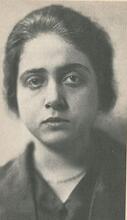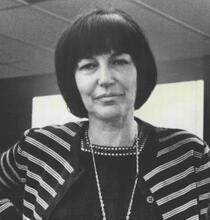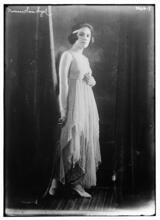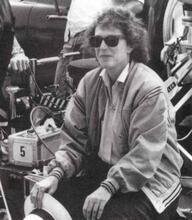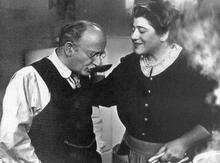Rokhl Holzer
Rokhl Holzer earned a reputation as an actress with a talent for transforming herself to suit any role, but her most remarkable transformation may have been her shift from Poland to Australia’s Yiddish theater. Holzer graduated from the Krakow Polish Drama School in 1925 and became a leading actor in the Polish National Theater while working with numerous Yiddish theater troupes. In 1938, while she was on a world tour, news arrived of Germany’s invasion of Poland, so Holzer settled in Melbourne. In 1939 she made her directorial debut with Froy Advokat, in which she also played the lead role. She became the lead actress. The highlight of her career was a 1966 performance of Babi Yar, a piece about the Holocaust, which left the audience stunned.
For Rokhl Holzer (sometimes spelled Holtzer), a riveting recital artiste and unforgettable star of the Yiddish stage, acting the part was never enough. She lived and breathed each role, mesmerizing audiences in Poland, Lithuania, Australia, Israel, the United States, France, Belgium, the Netherlands, and Sweden with her ability to transform herself into any character she portrayed. Holzer was also an adept and adored director of the Yiddish theater, a true team worker who brought out the best in all with whom she shared the stage.
Early Life and Family
Rokhl Holzer was born in Cracow, Galicia, in 1899. Her childhood home was filled with music and politics. Her father Ignacy (Isaac) Holzer (c. 1875–1939), a housepainter, was a Bundist and chairman of the Cracow Yiddish Workers’ Union. Her mother, Anna Holzer, née Blatt (1875–1954), was a homemaker. The couple had six children: Leon (1895–1972), Rokhl, Iza (1905–1998), Dosia (1907–2002), Henry (d. Auschwitz 1942), and Alois (d. aged three). Anna spent the war in hiding with her daughter Dosia, son-in-law Mietek Belza, and grandchildren Andrew (b. 1933) and Yola (b. 1943).
It was through the Cracow Yiddish Workers’ amateur theater group that Holzer made her acting debut at age six in Jacob Gordin’s Di Emese Kraft (The True Power). She was instantly smitten with a love and passion for the theater that lasted her entire lifetime.
Holzer became a professional actor in the Polish theater after graduating from Cracow Polish Drama School. In 1925 she joined the Polish theater under the direction of Anthony Piekarski. She was a leading actor with the Polish National Theater and many other theater companies.
Yiddish Theater in Poland
Holzer made her Yiddish theater debut in 1926, performing with the newly formed Krakauer Yidish Kunst Teater (Cracow Yiddish Art Theater), the first state-subsidized Yiddish community theater in liberated Poland, which was founded on October 23, 1926. Holzer appeared in the theater’s first production, Alter Kaczyzner’s Dukhus. She remained with the troupe until 1928, working under the direction of Jonas Turkow (1898–1988), who in 1931 wrote Holzer’s biography for the Lexicon of the Yiddish Theater. In 1927 Holzer spent a season performing with the legendary Vilna Troupe in Lvov (Lemberg). In 1929 she moved to Warsaw, where she joined the Bund.
Holzer had a meteoric rise, with theater troupes all over Poland clamoring for her to work with them. She was a leading actor in many Yiddish theater troupes of pre-war Europe, working with legendary actors and directors, including David Herman (1876–1937), Ida Kaminska, and Zygmunt Turkow (1896–1970).
Holzer performed constantly. When not leading a play, she toured throughout the provinces, cities, and towns of Poland performing wonderful “word concerts” in which she recited the works of Yiddish and European writers. She also appeared in vaudeville shows in Warsaw, alongside Yiddish comics Shimon Dzigan (1905–1980) and Israel Schumacher (1908–1961). In 1936 Holzer starred in the first Yiddish talkie to be made in Poland, the melodrama Al Khet (I Have Sinned). The film was a popular success, drawing huge audiences for many months.
In 1938 Holzer left Warsaw for a world tour of “word concerts.” Her farewell concert, organized by Ida Kaminska’s Yiddish theater company, sold out the 1500-seat Nowosci Theater and many fans had to be turned away. Holzer’s world tour began in Western Europe with highly acclaimed recitals in Paris, Brussels, Antwerp, and Amsterdam. She then traveled to Melbourne, Australia, where her sister Iza lived. Holzer arrived in Melbourne on April 2, 1939, together with her husband Chaim Rosenstein (1898–1966), a Yiddish writer, dramaturge, translator and theater critic. Holzer’s reputation as one of Europe’s finest actors had preceded her and her arrival was greeted with much fanfare not only by the Melbourne Yiddish community but also by the Australian press.
Australian Career
Holzer made her Australian debut in Sydney barely two weeks after arriving in Australia. Her first Melbourne appearance was on April 15, 1939, under the auspices of the Jewish Cultural Centre, Kadimah. On stage, Holzer’s face, gestures and body translated each Yiddish word into action. Her ability to transcend language and to transform herself with incredible range earned her rave reviews.
Holzer had planned to spend six months in Melbourne before performing in London and New York and then returning to Poland, but when the Germans invaded Poland on September 1, 1939, Melbourne became Holzer’s new home. Her sister Dosia also emigrated to Australia after the war.
Holzer became involved with the Yiddish theater groups at Kadimah, first with Yidish Bimeh (Yiddish Stage) and then with the Dovid Herman Teater (the David Herman Theatre). In October 1939 she became the first woman in Australia to direct a Yiddish play, choosing Froy Advokat (Madame Lawyer), a comedy by Louis Verneuil about women’s right to independent careers. The play had been translated from French into Yiddish by Holzer’s husband, Rosenstein. As well as directing, Holzer played the lead role with aplomb.
Holzer’s performances on Melbourne radio included her acclaimed 1940 recital of excerpts from Escape Me Never (1935), a film starring Elisabeth Bergner. She also appeared on Australian television and in the English-language theater.
Holzer became a leading actor and director with the Dovid Herman Teater, where she directed more than twenty-five plays and performed in countless more. In April 1940 Yankev Waislitz, with whom Holzer had worked in the Vilna Troupe, returned to Melbourne. Holzer and Waislitz co-produced a comedy entitled Freud’s Theory of Dreams. This was the beginning of their powerful creative partnership. Together, they steered the Dovid Herman Teater through its golden era. Her work as a director has been described as gentle, unassuming and exacting. Holzer had an instinctive feel for theater and boundless patience with the cast, devoting time to people who only had a single line in a performance
Later Career Successes
In 1941 Holzer and Waislitz co-produced a number of revues, as well as a tribute evening in honor of the twenty-fifth anniversary of the death of Sholem Aleichem (1859–1916). Holzer performed in the one-act play Mentshn (People), as well as in a magnificently executed excerpt from Motl Peysi dem khazns (Motl Peysi, the Cantor’s Son). On October 11, 1941 Holzer and Waislitz also produced a concert in honor of the birthday of Peretz Hirschbein, the founder of the Yiddish Art Theater in Odessa, who was visiting Melbourne. The fast pace continued and in 1942 Holzer directed Der Foter (The Father) by August Strindberg, which became one of her favorite plays. Holzer and Waislitz also produced “An evening of Russian humor,” presenting three Chekhov plays: The Jubilee, A Tragedy Against His Will and The Proposal. Holzer was considered one of Melbourne’s leading directors. She worked tirelessly with immigrant factory workers, drawing professional performances from amateur casts. She constantly sought new material, sourcing modern theater works as well as Yiddish and European classics.
Holzer was drawn to plays that portrayed strong, independent women, such as Froy Advokat and Dray Froyen (Three Women) by Morozowicz-Szczepkowska. The latter, written by a woman, combined comedy and drama in exploring themes of women’s independence. Holzer directed and played the lead role in Dray Froyen several times, in what was considered one of her best roles. Holzer also favored
Jacob Gordin’s social dramas, including Mirele Efros.
In 1950 Holzer left Melbourne, finally continuing the world tour she had first begun in 1939. She performed almost sixty concerts and countless radio broadcasts in Paris, Brussels, London, Geneva, Stockholm, Haifa and Tel Aviv. Deeply affected by the Holocaust and by the experiences of those she had left behind in Europe, Holzer always began her recitals with the Partisan Song by Hirsch Glik (1922–1944). Her performances were stark. She used very few props, but every fiber of her being conveyed meaning and atmosphere.
Holzer returned to Melbourne in 1951, continuing to astound audiences with her authenticity in portraying coarse simpletons, uneducated peasants and women on the brink of madness—characters that were in sharp contrast to her cultured, intelligent and refined off-stage presence. Every production directed by Holzer and every role that she performed received critical acclaim. But Holzer’s most legendary moment was in Melbourne, in March 1966, at a recital given by visiting Russian poet, Yevgeny Yevtushenko. Before an audience of six thousand, Holzer recited Yevtushenko’s Babi Yar, which tells of a ravine near Kiev where thousands of Jews were murdered by the Germans. Holzer whispered and roared as she became the mothers who had lost their children, she trembled as she embodied the grief and the loss of thousands of her people. Yevtushenko was visibly moved by Holzer’s haunting Yiddish recital, as were all present. There was not a dry eye in the audience. The Australian press described her recital as electrifying.
In 1977 Holzer starred in Di Hiltserne Shisl (The Wooden Bowl) by Edmond Morris, Yiddish by Dr A. Tsimmerman. Director Shia Tigel adapted the story, changing the protagonist from an elderly father to an elderly mother so that Rokhl Holzer could play the leading role. Her empathic portrayal penetrated to the core in her unforgettable final performance.
Legacy
Holzer’s stage career extended across continents, lasting more than fifty years. She was a powerful presence in the Yiddish theater, a warm, wise, gentle and dignified actor and director, who was highly respected and deeply loved. Yiddish poets Y. M. Levin and A. Cykert published odes to Rokhl Holzer in Di Oystralishe Yidishe Nayes in 1979 and 1980 respectively.
While Holzer did not give birth to any children, believing that the world was an unfit place for a child, she became like a mother to the young actor Paula Kochen, whom she called mayn tokhterl [sic] (my little daughter). With Holzer as her mentor, Kochen too became a star of the Yiddish theater, first appearing in the Holzer production Be-Arvot ha-Negev (In the Negev Desert) in 1950.
Holzer lived her last years in the Smorgon Wing of Montefiore Homes before dying on November 14, 1998. In an interview for her ninetieth birthday, she told Australian Jewish News journalist Peter Kohn, “I was born with this love [for the stage]. If I had my life to live again, I would choose a career on the stage again. Definitely.”
Performances
(Partial) List of plays performed and directed with the Dovid Herman Theatre, Melbourne, Australia
Director; Co-Director; Lead Actor
1939
Froy Advocat (Madame Attorney). D, LA.
1940
Khasye di Yesoyme (Chasia the Orphan). D, LA; Dray Froyen (Three Women). D, LA; Parnose (Making a Living). CoD, LA (?); Der Broyt Mil (The Bread Mill). LA; Der Foter (The Father). D, LA.
1941
Muter (Mother). D, LA; Atentat (The Assassins). D, LA (?); A Fremd Kind (An Imaginary Child). D, LA; Dos Lebn Ruft (Life is Calling). CoD, LA.
1942
An evening of Russian humor. CoD, LA; Der Shotn (The Shadow). D, LA (?); Der Foter (The Father). Director, LA.
1947
Der Foter (The Father). D, LA.
1948
Mirele Efros. D, LA; Froy Advocat (Madame Attorney). D, LA.
1950
Be-Arvot ha-Negev (In the Negev Desert). D, LA.
1951
Mirele Efros. D, LA
1952
Dray Froyen (Three Women). D, LA.
1953
Di Moral fun Madam Dulska (Madame Dulska). D, LA.
1954
Mit Ofene Oygn (With Open Eyes). D, LA.
1956
Royte Royzn (Red Roses). D, LA.
1960
Der Toyt fun a Seylsman (The Death of a Salesman). LA.
1961
Der Mazldiker Shtrayk (The Lucky Strike). D, LA.
1962
Bek-Leyn Tsenter (Back Lane Centre). LA.
1963
Shmates (Rags). D, LA.
1965
Froy Advocat (Madame Attorney). D, LA.
1967
Madam Adler (Madame Adler). D, LA.
1970
A Tog in Ir Lebn (A Day in Her Life). D, LA.
1973
Di Mishpokhe Kahane (The Cahane Family). LA.
1975
Shver tsu zayn a Yid (It’s Hard to Be a Jew). LA.
1977
Di Hiltserne Shisl (The Wooden Bowl). LA.
Ajzenbud, Moishe. The History of the Dovid Herman Theatre (Yiddish). Melbourne: 1998.
Holzer, Rokhl. “Yidish Teater in Kroke” (Yiddish Theater in Cracow). In Yidisher Teater in Ayrope Tsvishn di Beyde Velt Milkhomes, Poyln (Yiddish Theater in Europe between the World Wars: Poland), edited by Itsik Manger, Jonas Turkow and Moyshe Perenson, 276–285. New York: 1968.
Sher, Yashe. “Rokhl Holzer—Eighty” (Yiddish). Di Oystralishe Yidishe Nayes, Melbourne, November 30, 1979, 3.
Kohn, Peter. “Yiddish Theater Star Remembers.” Australian Jewish News, Melbourne: December 22, 1989, 21.
Zable, Arnold. “Queen of the Yiddish Stage.” Australian Jewish News, Melbourne: December 4, 1998, 17–18.
Idem. Wanderers and Dreamers: Tales of the David Herman Theatre. Melbourne: 1998; Zylbercwaig, Zalmen (ed). Lexicon of the Yiddish Theater, volume 1 (Yiddish). New York: 1931, 580, entry by Jonas Turkow.
The assistance of librarians at the Jewish Cultural Centre and National Library, Kadimah (Melbourne), particularly Rachel Kalman and Naomi Jacobson, is gratefully acknowledged.
Members of Rokhl Holzer’s family: Ralph Renard, Yola Gold (née Belza) and Pola Boltman (née Kochen) also provided invaluable information and their assistance is also gratefully acknowledged.
Thanks also to Elka Helen Burstin and Symcha Burstin, parents of the contributor, who provided personal knowledge and recollections of Rokhl Holzer. Elka Helen Burstin’s stepfather, Motl Rosenstein, was Rokhl Holzer’s brother-in-law.
The contributor has also drawn on her own recollections, particularly of Holzer’s final, unforgettable performance in Di Hiltserne Shisl (The Wooden Bowl).



